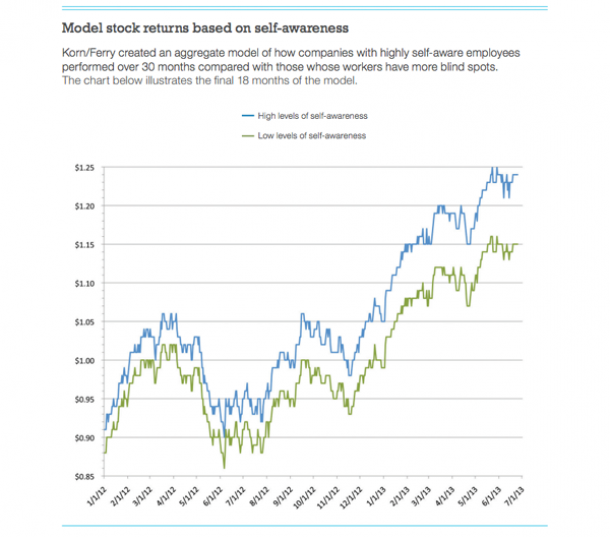Study: Self-Awareness Correlated to Stock Performance
Forbes recently published an article that comments on the findings of a whitepaper from two researchers who found a link between the financial performance of 486 publicly traded companies and the “self-awareness” level of people working at those companies.Intrigued by this finding, we naturally wanted to know more about how the researchers came to this conclusion, however, the Forbes article is a little sketchy on details so we decided to track down the original research:

In brief, the whitepaper was put together by two researchers from The Korn/Ferry Institute (KFI) who analysed 6,977 self-assessment results (using their ProSpective Assessment). The questionnaire is taken online using a LinkedIn application and produces the following tab of information:

If you use LinkedIn, you can take the assessment for yourself (see link below).
The list of skills, which KFI term "leadership characteristics," include:
- Acting with Honour and Character
- Being Open and Receptive
- Being Organisationally Savvy
- Caring About Others
- Communicating Effectively
- Creating the New and Different
- Dealing with Trouble
- Demonstrating Personal Flexibility
- Evaluating and Deploying People Accurately
- Focusing on Actions and Outcomes
- Focusing on the Bottom Line
- Getting Organised
- Getting Work Done Through Others
- Inspiring Others
- Keeping on Point
- Making Complex Decisions
- Managing Diverse Relationships
- Managing Up
- Managing Work Processes
- Relating Skills
- Understanding the Business
The KFI researchers found that 79% of those evaluated online had at least one "blind spot" — a skill that an employee counted among his or her strengths when coworkers cited that same skill as one of his or her weaknesses.
KFI considered people exhibiting three or more blind spots to have low self-awareness.
With definitions for high and low self-awareness established, the researchers were able to plot the two groups against the rate of return (ROR) of those companies’ stock price. The analysis demonstrated that, on average:
- Poorly performing companies’ employees had 20% more blind spots than those working at financially strong companies.
- Poor-performing companies’ employees were 79% more likely to have low overall self-awareness than those at firms with robust ROR.
In their conclusion, the researchers noted that “Addressing blind spots and increasing self-awareness have long been seen as positives for individuals. Now we have statistical findings that suggest benefits also exist at the macro level of an organisation… it turns out that helping employees to better understand themselves and fostering a culture of healthy feedback could also help to improve an organisation’s overall performance.”
To see the whitepaper, "A Better Return on Self-Awareness" go here.
To take the "ProSpective Assessment" via LinkedIn go here.
Topics:
Emotional Intelligence
Theo Winter
Client Services Manager, Writer & Researcher. Theo is one of the youngest professionals in the world to earn an accreditation in TTI Success Insight's suite of psychometric assessments. For more than a decade, he worked with hundreds of HR, L&D and OD professionals and consultants to improve engagement, performance and emotional intelligence of leaders and their teams. He authored the book "40 Must-Know Business Models for People Leaders."

/The%20Human%20Capital%20Factors%20that%20drive%20Stock%20Performance.png?width=374&name=The%20Human%20Capital%20Factors%20that%20drive%20Stock%20Performance.png)
/Sample%20%20Job%20description%20template.png?width=374&name=Sample%20%20Job%20description%20template.png)
We Would Like to Hear From You (0 Comments)